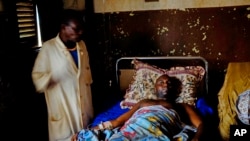In the Central African Republic (C.A.R.) - almost 2 years of conflict - has left the country’s 2nd city, Bambari, without a government. The only establishment still functioning is the main hospital where doctors and nurses perform surgery on victims from recent fighting under threats from armed men.
On a rubber mattress, in a simple metal-frame bed, lay Ephraim Bichimbao. His head is covered in bandages. The 24-year-old suffered a machete blow to the head when fighting broke out at a Seleka rebel-controlled checkpoint.
“The rebels wouldn’t let women pass. I went to check on the situation,” said Bichimbao.
He arrived here just two days ago after spending 11 days travelling by road and river to reach the region’s only functioning hospital.
“I was hiding in the bush when a group of fishermen found me and brought me here,” he said.
Tit-for tat violence between Seleka rebels and anti-balaka militias has devastated entire villages, displaced thousands and left countless dead and wounded.
The hospital’s already inadequate resources are strained beyond the limit. The operating room and the maternity ward are only functioning with the assistance of the International Red Cross and the global charity, Save the Children.
Pain medication is in short supply - making surgery an ordeal.
Doctor Joseph Bama - born and raised in Bambari, where his father was a doctor before him - says attacks on civilians are on the rise in recent months. On one day in September the hospital received 61 wounded from one village alone. A few weeks later, 31 patients arrived from another village.
Dr. Bama says those that do make it to the hospital have survived incredible odds.
“Men, women and children hide in the bush for days before they seek care for bullet wounds and machete cuts,” said Doctor Bama.
As if the situation wasn’t tough enough, hospital staff have the added stress of working under the threat from attack. Dr. Bama says armed men, mainly from the Seleka rebels, regularly enter the hospital.
"At one point we had to hide a man who had suffered a gun-shot wound in the maternity ward. The man was a member of the militia, the anti-balaka, and the Seleka came looking for him," he said.
Treating trauma cases from the violence is a constant - making medical care for illness even tougher. The leading cause of death in the Ouaka region, where Bambari is the capital, is not the continuing violence but malaria.
When the rebels attacked and burned her village, Olga Ngoayi fled to Bambari.
Displaced and seven months pregnant, she is suffering from malaria.
She joins other women in the maternity ward recovering from wounds suffered as they fled fighting.
Despite these near impossible conditions, Dr. Bama says the hospital staff is determined to stay open.
“In a region where there is very little political authority,” said Bama, “The hospital is one reminder that the country still exists.”




